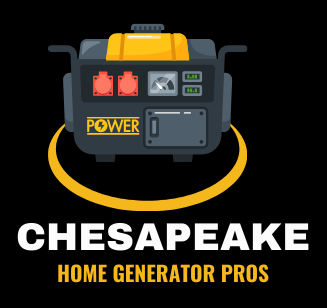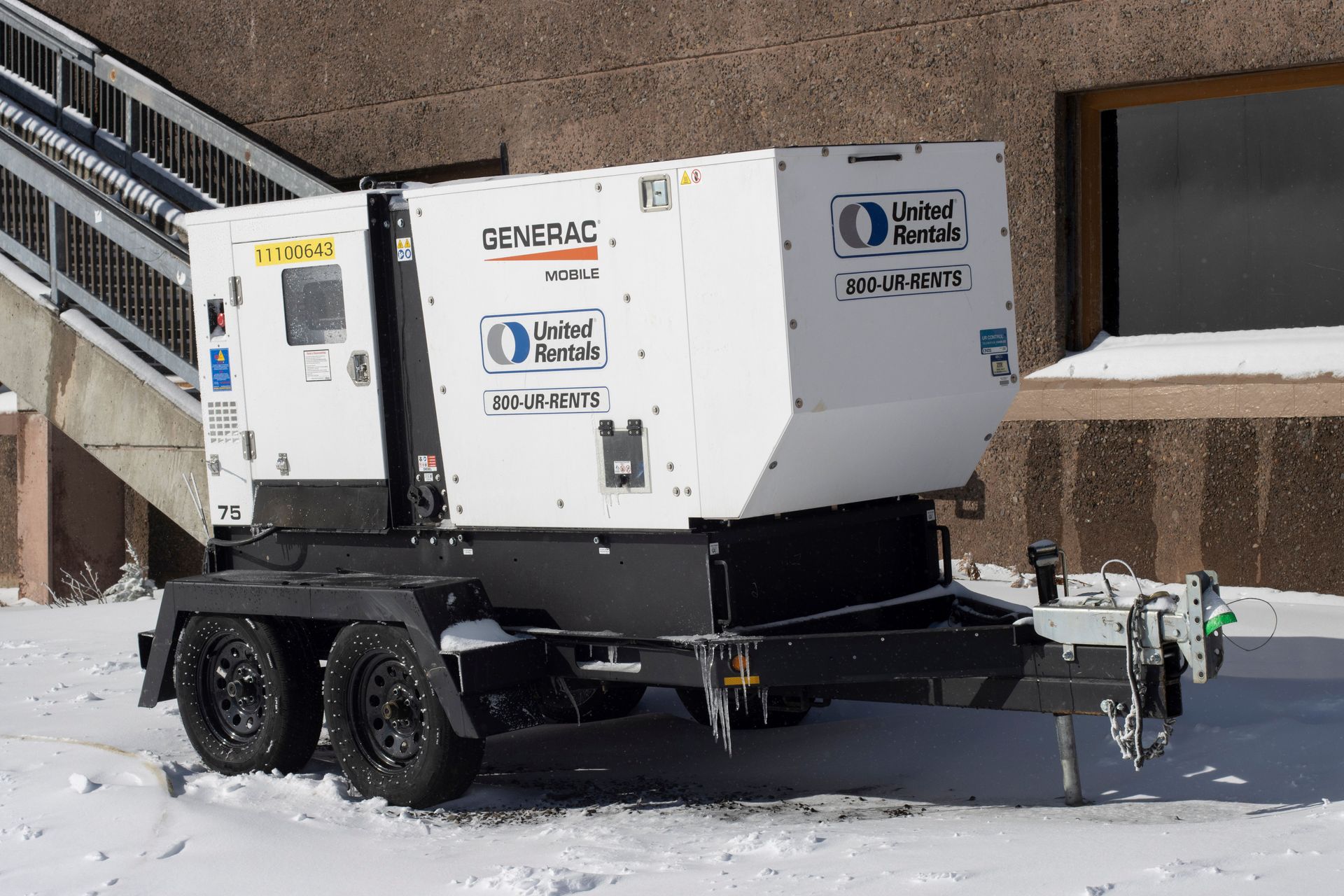
Propane Generators in Chesapeake VA
Propane generators are devices that convert propane gas into electrical energy. Unlike traditional diesel or gasoline generators, propane generators use propane as their fuel source. Propane is a clean-burning fuel, which means these generators are often more environmentally friendly and produce fewer emissions. These generators are ideal for providing backup power during outages, as well as for use in remote locations where traditional fuel sources might not be readily available.
Key Components and Their Functions
A propane generator is made up of several key components:
- Engine: This is the heart of the generator, where propane fuel is burned to create mechanical energy. The engine's power output determines how much electricity the generator can produce.
- Alternator: The alternator converts the mechanical energy from the engine into electrical energy. It produces the alternating current (AC) that powers your appliances and devices.
- Fuel System: This includes the propane tank and fuel lines that deliver propane to the engine. The fuel system ensures a steady supply of propane for uninterrupted operation.
- Cooling System: Generators generate heat during operation, and the cooling system helps manage this heat to prevent the engine from overheating.
- Control Panel: The control panel allows you to start, stop, and monitor the generator. It often includes gauges for fuel level, output voltage, and engine temperature.
- Battery: Many propane generators use a battery to start the engine. The battery provides the initial power needed to crank the engine.
Applications and Uses
Propane generators are versatile and can be used in various settings:
- Residential Backup Power: In areas prone to power outages, a propane generator ensures that essential appliances, such as refrigerators and heating systems, continue to function.
- Construction Sites: These generators provide reliable power for tools and equipment at construction sites, especially in remote areas without access to traditional power sources.
- Recreational Use: Campers and RV enthusiasts use propane generators to power lights, appliances, and entertainment devices while on the road or in remote locations.
- Emergency Response: During emergencies, such as natural disasters, propane generators are used to power medical equipment and communication devices.
Installation and Maintenance
Proper installation and maintenance are crucial for ensuring the reliable operation of your propane generator. Here’s what you need to know:
- Installation: A professional installer will help position the generator and connect it to your propane supply. They will ensure that all safety codes and regulations are followed.
- Maintenance: Regular maintenance is essential to keep the generator running smoothly. This includes checking the oil, changing the air filter, and inspecting the fuel system. It’s also important to test the generator periodically to ensure it’s in good working order.
- Storage: Propane tanks should be stored in a well-ventilated area, away from sources of heat or ignition. The generator itself should be kept clean and free from debris.

We will get back to you as soon as possible.
Please try again later.
How It Works
When the propane generator is turned on, the engine burns propane gas from the fuel tank. This combustion process creates mechanical energy, which drives the alternator. The alternator then converts this mechanical energy into electrical energy. The electricity is then sent to the control panel, where you can direct it to various appliances and devices. Propane generators are typically equipped with automatic transfer switches, which detect power outages and automatically start the generator to provide power to your home or business.
Cost Considerations
The cost of a propane generator can vary widely based on its size, capacity, and features. Smaller, portable models are generally less expensive, while larger standby generators with higher capacities and advanced features will cost more. In addition to the initial purchase price, consider the cost of installation, maintenance, and propane fuel. While propane generators may have a higher upfront cost compared to gasoline or diesel models, their lower fuel costs and longer lifespan can make them a cost-effective option in the long run.
Reliability and Performance
Propane generators are known for their reliability and performance. Propane is a stable fuel that does not degrade over time, which means it can be stored for long periods without losing its effectiveness. Additionally, propane generators are less prone to issues related to fuel contamination and engine deposits compared to gasoline or diesel generators. Regular maintenance and proper care can further enhance the reliability and performance of your generator.
If you’re considering a propane generator for your home or business, our team is here to help. We offer a range of
propane generators in Chesapeake, VA to suit your needs, along with professional installation and maintenance services. Contact us today to discuss your requirements and find the perfect solution for reliable, efficient power.
Times to Think About Using Propane Generators
In an era where reliable power is essential, propane generators have emerged as a popular alternative to traditional gasoline or diesel-powered options. Whether you're looking to ensure your home remains powered during outages or need a dependable backup for your business, understanding the right time to consider a propane generator can make all the difference. In this article, we'll explore various scenarios where a propane generator could be the ideal choice for your power needs.
Frequent Power Outages
If you live in an area prone to frequent power outages due to weather conditions, natural disasters, or an unreliable grid, a propane generator can provide a steady and reliable backup power source. Unlike gasoline generators, propane generators offer longer storage life for fuel and can run more consistently, ensuring your home or business stays operational even during extended outages.
Seeking a Cleaner Energy Option
Propane is a cleaner-burning fuel compared to gasoline or diesel. If you are environmentally conscious and want to reduce your carbon footprint, propane generators are a better choice. They produce fewer emissions and have a lower environmental impact, making them an attractive option for those looking to make a more eco-friendly choice.
Running a Business
For businesses that require uninterrupted power to maintain operations, a propane generator can be a valuable asset. Whether you're running a restaurant, retail store, or medical facility, having a reliable power source is crucial. Propane generators offer high efficiency and are capable of handling the power needs of various types of businesses, minimizing downtime and ensuring customer satisfaction.
Remote Locations
If your property is located in a remote area where access to gasoline stations may be limited, a propane generator can be more practical. Propane tanks can be refilled less frequently and are often easier to transport than large quantities of gasoline. This makes propane generators a convenient choice for cabins, vacation homes, or rural properties where fuel availability might be a concern.
Extended Storage Needs
Propane has a long shelf life and can be stored safely for extended periods. If you prefer to have a backup power source that doesn’t require frequent fuel changes, a propane generator is ideal. Propane tanks can be stored for years without deteriorating, ensuring you always have fuel on hand when you need it.
Safety and Maintenance
Propane generators generally require less maintenance compared to gasoline or diesel generators. They have fewer moving parts and are less prone to issues related to fuel degradation or engine wear. Additionally, propane is less flammable than gasoline, making it a safer option for home use. If ease of maintenance and safety are priorities for you, propane generators offer a simpler and more secure choice.
If you're considering investing in a propane generator and need expert advice on selecting the right model for your needs, don't hesitate to reach out to us. Our team is here to help you navigate your options, answer your questions, and ensure you find a generator that fits your requirements perfectly. Contact us today to learn more and take the first step towards a reliable and efficient power solution.
Factors to Consider When Choosing a Propane Generator
Propane generators are an excellent choice for those seeking a reliable and efficient power source. They are known for their clean-burning fuel, which makes them a popular option for both residential and commercial use. Whether you're preparing for an emergency or looking for a backup power source, understanding the key factors to consider when choosing a propane generator will help you make an informed decision. This guide will walk you through the essential considerations to ensure you select the right generator for your needs.

Power Output
One of the most critical factors to consider is the power output of the generator. You need to determine the wattage required to run your essential appliances and equipment. Propane generators come in various sizes, so it’s important to choose one that matches your power needs. To calculate this, list all the items you plan to power and add up their wattage. Choose a generator with a capacity that exceeds this total to ensure smooth operation and to handle any additional load.
Fuel Efficiency
Fuel efficiency is another important factor. Propane generators are known for their clean operation and efficient fuel use compared to gasoline models. However, efficiency can vary between models. Look for generators with high fuel efficiency ratings to ensure you get the most out of each gallon of propane. This will not only save you money on fuel but also reduce the frequency of refueling during extended power outages.
Runtime
The runtime of a propane generator refers to how long it can operate on a single tank of fuel. A longer runtime means less frequent refueling, which is especially important during emergencies or long-term power outages. Check the generator’s specifications to understand how long it can run at different loads. Consider your typical usage patterns and choose a generator that offers adequate runtime to meet your needs.
Portability and Size
Depending on your requirements, you may need a generator that is easy to move. Smaller, portable generators are ideal for camping, outdoor events, or as a backup for small household needs. Larger, stationary units are better suited for providing power to entire homes or businesses. Evaluate the size and weight of the generator, and ensure you have the necessary space and infrastructure to accommodate it. Portability features, such as wheels and handles, can be beneficial if you need to relocate the generator frequently.
Noise Level
Noise can be a significant factor, especially if you live in a residential area or plan to use the generator in a setting where noise is a concern. Generators are rated for noise levels in decibels (dB). Look for models with lower noise ratings to ensure they operate quietly. Some generators are designed with noise-reducing features or enclosures to minimize sound, making them more suitable for noise-sensitive environments.
Ease of Use and Maintenance
Consider how easy it is to operate and maintain the generator. Features such as electric start, automatic shut-off, and user-friendly controls can enhance convenience. Regular maintenance is crucial for the longevity and efficiency of the generator, so choose a model with straightforward maintenance requirements. Check for accessible service points, and ensure that the manufacturer provides clear instructions for upkeep.
Durability and Build Quality
The durability of a generator is vital for long-term reliability. Look for models made from high-quality materials that can withstand various weather conditions and rough handling. Stainless steel or powder-coated frames and durable components can extend the lifespan of the generator. Reading customer reviews and ratings can provide insights into the build quality and reliability of different models.
Brand Reputation and Support
Choosing a generator from a reputable brand can ensure you receive a reliable product and good customer support. Research different brands and their customer service records. A reputable manufacturer will offer warranties and support services to address any issues that arise. Check for the availability of replacement parts and the ease of accessing support if needed.
Choosing the right propane generator involves careful consideration of several factors to ensure it meets your specific needs. From power output and fuel efficiency to portability and maintenance, evaluating these aspects will help you make a well-informed decision.
If you have any questions or need assistance in selecting the perfect propane generator for your needs, don’t hesitate to contact us. Our team of experts is here to provide guidance and help you find the ideal solution for your power needs. Reach out to us today to get personalized advice and support.
Let's Connect!
As power outages become increasingly common, having a reliable backup generator can make all the difference. We specialize in providing top-notch generator installation and maintenance services to keep our customers prepared for anything. Whether you're looking for a whole-house generator or a small portable unit, we have the knowledge and expertise to help you choose the right option for your home and budget. Don't let life's unexpected power outages catch you off guard—hire us today and enjoy peace of mind knowing that your home is protected.